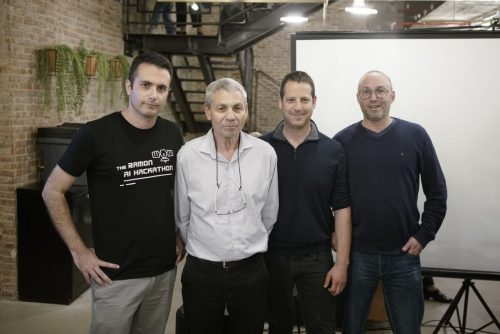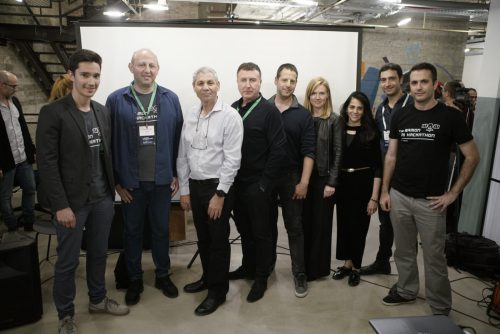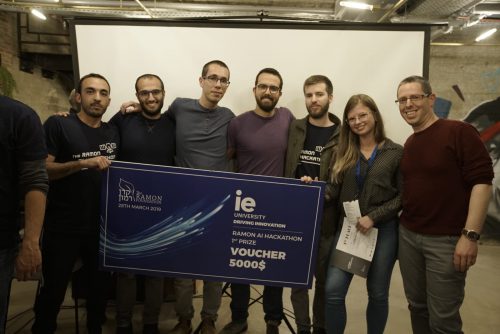This is one of the last projects approved by the late Rona Ramon, the Bride of the Israel Prize. "Israel is the champion of data science and also has a 360-degree ecosystem in the field of space, the Earth is photographed from space in great detail, but there are not enough start-ups that link the two things, so we decided to establish the space innovation community and hold the AI from space hackathon", so Ran Levana, CEO of the Ramon Foundation, explained



A new project of the Ramon Foundation will encourage the establishment of new startups in the field of artificial intelligence from space, with the aim of forming an "innovation community in space".
The culmination of the project is the AI from Space hackathon that took place last week around three data-based challenges from space in the fields of: security, maritime and business. This is one of the last projects approved by the late Rona Ramon before her death. The hackathon in collaboration with the Israel Space Agency, IAA, Airbus, ISI, BE All, venture capital funds, space agencies from around the world, and more.
Oracle Israel, which participates in the project, will provide the cloud infrastructure and computing power required for rapid processing of the photographs, in the amount of tens of terabytes.
First place was won by the Space club group that developed algorithms that integrate satellite images with indices of the weather forecast and sun rays, in order to understand which areas are more attractive to companies that install solar panels. The level of accuracy may reach up to the level of the building. The jury included representatives of venture capital funds that invest in companies in the solar energy field, who testified that the development may be a "game changer" in the field.
In second place, the Poseidon group, facial recognition, for ships: the group presented a unique technology that allows specific ships to be identified from space through a combination of facial recognition technologies and satellite images. The development makes it possible to trace the history of each vessel at the individual level, something that does not exist today.
In third place, the SAT Images 3D group that managed to produce XNUMXD models of buildings using only satellite images. The model is unique because it makes it possible to detect changes in the height of buildings over time, a development that greatly facilitates the tracking of construction violations, down to the meter level or abnormal construction in large areas.
And in fourth place, a group that developed a neural network that successfully performed automatic labeling of objects from space based on images from space databases. For example, identifying stadiums around the world.
The winners were announced from among 17 teams by Avi Blasberger, Director of the Israel Space Agency at the Ministry of Science.
"Israel is the champion of data science and also has a 360-degree ecosystem in the field of space, the Earth is photographed from space in great detail, but there are not enough start-ups that link the two things, so we decided to establish the space innovation community and hold the AI from space hackathon", so Ran Levana, CEO of the Ramon Foundation, explained in an interview with the writer of these lines.
The interview was conducted following the hackathon held by the association together with the Israel Space Agency, Oracle, the Aerospace Industry, Be All, Airbus and the satellite photo company ISI.
"To do what Ilan Ramon would do if he came back from space"
"The Ramon Foundation was established in 2010 by Rona Ramon to do what Ilan Ramon would have done if he had returned from space. I didn't know Ilan, but all of his friends on the foundation's executive board said that if he came back, he would be involved in education and help entrepreneurs implement innovation and not run into politics. A year ago in June, there was a meeting of the executive committee where we did a review of the renewable space industry, an industry that was worth 250 billion dollars two years ago and today 350 billion and is on its way to a trillion," Levana said.
According to him, "There are between 40 and 45 companies in the space sector in Israel, including large companies such as Israel Aerospace Industries and Rafael, and start-ups, but most of them are dual-use companies. For example, Stamrad builds space suits that protect against radiation for NASA, but also suits for workers in nuclear reactors. After research we conducted and meetings we held, it became clear that graduates of the satellite units in the army do not open start-ups in the field of satellite images, because these images are very expensive, and this has been repeated. The Israelis are champions of data science, machine learning, deep learning and big data. But only a few start-ups are engaged in the field of space".
He added that "We joined partners: Be All - a network of work complexes, which provided us with offices with cubicles and infrastructure. Oracle provided us cloud services - a very expensive and very heavy thing. These are pictures of gigs and you need serious machines to develop the algorithms that analyze them. Along with the two bodies that provide the infrastructure, we teamed up with three very serious space companies - the Aerospace Industry helped us a lot with the characterization and definitions of the hackathon and sent mentors, ISI (operators of the Eros civilian photo satellites) helped us with the same issues and Airbus provided us with exceptional satellite images. Airbus allowed us access to images taken from different types of satellites."
"The Israeli Space Agency opened for the first time the photo database of the Venus satellite, which surveys the Earth in a variety of wavelengths. This is the first time that the images of Venus have been opened up to developers to aid development. "Oracle Israel, which participates in the project, will provide the cloud infrastructure and computing power required for rapid processing of the photographs, amounting to tens of terabytes," Levana noted.
Inbal Kreis, Vice President of the Aerospace Industry, said that "IAI is happy to take part in this welcome initiative. It's amazing to see how the entire ecosystem of prominent space companies in Israel mobilizes to work together and help entrepreneurs."
Uzi Sorkis, CEO of Be All, stated that "the long-term cooperation with the Ramon Foundation is aimed at improving and optimizing Israel's capabilities in the field of space. Therefore, we are establishing together an incubator for start-ups and companies in the field of space, which includes laboratories, offices and professional events adapted to practitioners in the field. We see the hackathon as a welcome initiative, and a springboard for the space field in general and entrepreneurs in the field in particular."
"In order to succeed as an entrepreneur in the field of space, you first need a good idea that has a real need among potential customers and advanced and innovative technology," said Avi Blasberger, Director of the Israel Space Agency at the Ministry of Science.
"Need for cloud infrastructure and extremely strong computing and processing power"
Assaf Sobol, business development manager at Oracle Israel, said that "in order to work in a short time with huge amounts of information received from satellites, a cloud infrastructure and extremely strong computing and processing power is needed. Oracle's cloud infrastructure provides developers with access to an unprecedented cloud environment with its computing power and fast processing capability, including GPU, in order to remove technical barriers and allow teams to soar beyond the cloud, into space."
According to him, "Oracle Israel has uploaded dozens of terabytes of satellite images to the OCI as well as a number of leading Open Sources. In addition, Oracle will make its data analysis platforms and analytics tools in the cloud accessible to the participants, this is to enable the teams to have strong and diverse processing capabilities."
Daniel Assig of Airbus Israel said that "Airbus Global is involved in a series of ventures in the field of geo-information using the satellites we have, our information and our systems. We support all over the world the development of new applications based on information from satellites. We believe that the Israeli entrepreneurs will be able to develop new concepts and applications from the information we provide."
